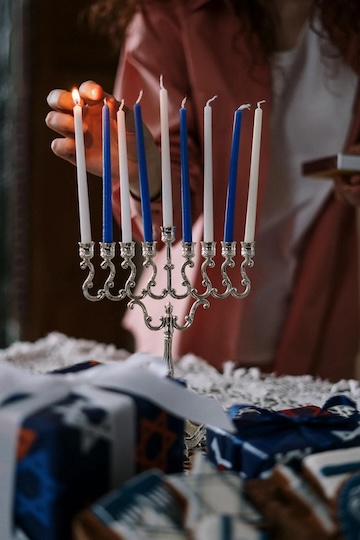It was mayhem outside the BC Provincial Court, near Main and Hastings, Aug. 20, as anti-Israel protesters screamed, chanted and shouted into megaphones to drown out the words of Dallas Brodie, member of the BC Legislature for Vancouver-Quilchena and leader of the upstart OneBC party.
Brodie attempted a media conference outside the courthouse before filing a “private prosecution” against Charlotte Kates, the Vancouver woman who is international coordinator for Samidoun, a group the government of Canada has designated a terrorist entity.
Kates was arrested by Vancouver police in April 2024 under suspicion of public incitement of hatred and wilful promotion of hatred, a criminal offence in Canada, after a public rally where she led a crowd in a chant of “Long live Oct. 7,” called the Hamas attack “heroic and brave” and described designated terrorists as “heroes.”
She was released on condition that she refrain from participating in any protest activities. Those conditions expired Oct. 8, 2024, when the BC Prosecution Service and the assistant deputy attorney general had not approved the charges recommended by police. It was a week later that her organization, Samidoun, was officially designated as a terrorist entity by the government of Canada.
Brodie’s prosecution – an obscure legal move similar to a citizen’s arrest – is unlikely to have a direct impact on the case, though it might refocus the spotlight on the failure of authorities to follow through on a criminal prosecution.
In a statement, the Centre for Israel and Jewish Affairs noted that a report to Crown counsel has been sitting on the desks of relevant officials for more than a year.
“Every day they do not press charges,” said CIJA’s Pacific region vice-president Nico Slobinsky in a statement, “she acts with increasing impunity, including by flying to Iran to receive a ‘human rights’ award from its government and attending the funeral of Hezbollah leader Hassan Nasrallah in Lebanon. Our legal system must send a clear message: antisemitism and hate have no place in British Columbia or anywhere else in Canada. Charges must be pressed without delay.”
Ezra Shanken, chief executive officer of the Jewish Federation of Greater Vancouver, observed that more than two-thirds of the BC Jewish community have reported experiencing an antisemitic hate incident.
“Individuals and organizations like Charlotte Kates and Samidoun have exacerbated this dramatic wave of antisemitism, which is why our community has been calling for accountability since her despicable remarks on April 26, 2024, on the steps of the Vancouver Art Gallery,” Shanken said. “Justice delayed is justice denied.”
We wrote in this space recently about an incident at the Jewish Community Centre of Greater Vancouver that clearly violated existing laws banning political protests at locations where official school functions are taking place. Police did not recommend charges in that instance.
The inner workings of the Crown prosecutors’ office and other components of the judicial process are not entirely transparent, the sensitivity of the issues they address necessitating a degree of privacy. However, some observers have suggested that there is a systemic problem up the ladder of the process. Police often do not pursue instances of apparent offences because they have seen prosecutors decline to charge. Prosecutors are said to hesitate to lay charges because they have seen courts throw out cases they presented.
There has been a great deal of hand-wringing about a massive spike in antisemitism, including violent incidents. There are many remediative and preventive opportunities that do not involve criminal charges – public awareness campaigns and restorative justice and diversion programs among them. But, at some point, the laws on the books to prevent the spreading of hatred and incitement to violence must be tested. If they do not stand up in court, then we as a society need a dialogue about what we will tolerate.
We may find that we need new laws that courts will uphold, so that Crown prosecutors will be empowered to lay charges, so that police will know that enforcement is not a waste of energy, and so that Canadians will recognize what is acceptable and what is not in our country.
What is not tolerable is doing nothing.




